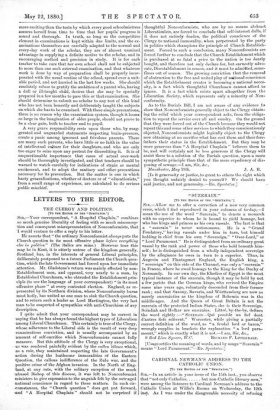"SUZERAIN."
[To THE EDITOR OF THE "SPECTATOR.] Si,—Allow me to offer a correction of a now very common error, which I find reproduced in your columns of to-day,—I mean the use of the word "Suzerain," to denote a monarch with no superior to whom he is bound to yield homage, but who has kings and princes as his own vassals. The fact is that a " suzerain " is never autonomous. He is a "Grand Feudatory," having vassals under him in turn, but himself holding in chief from his own "Sovereign," "Over-Lord," or "Lord Paramount." He is distinguished from an ordinary great vassal by the rank and power of those who hold beneath him- self ; he is distinguished from a wholly independent sovereign by the allegiance he owes in turn to a superior. Thus, hi Angevin and Plantagenet England, the English king, a "sovereign" on this side of the Channel, was only a" suzerain" in France, where he owed homage to the King for the Duchy of Normandy. In our own day, the Khedive of Egypt is the most typical instance of the suzerain, though it may be held by not a few jurists that the German kings, who revived the Empire some nine years ago, voluntarily descended from their former rank ; anti that Saxony, Bavaria, and Wurttemberg are now as merely suzerainties as the kingdom of Bohemia was in the middle-ages. And the Queen of Great Britain is not the suzerain of the protected Indian States, she is their Sovereign. Scindiah and Holkar are suzerains. Littre, by-the-by, defines the word rightly :—" SUZERAIN—Qui possede sin fief dorit
d'autres fiefs reMvent." Worcester, while giving a partially correct definition of the word, as "a feudal lord or baron," wrongly supplies in brackets the explanation "a lord para-
mount," which is exactly what it is not.—I am, Sir, &c., •
[Usage settles the meaning of words, and, by usage " Suzerain " means "Lord Paramount."—En. Spectator.]


































 Previous page
Previous page